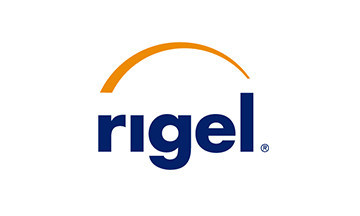| | - Updated interim analysis from Phase 2 registrational study highlights 35% of mIDH1 R/R AML patients who received olutasidenib achieved CR+CRh with a median duration of 25.9 months
- Presentations across the Company’s commercial and clinical-stage hematology-oncology portfolio underscore commitment in this space
SOUTH SAN FRANCISCO, Calif., Nov. 3, 2022 /PRNewswire/ -- Rigel Pharmaceuticals, Inc. (Nasdaq: RIGL) today announced the upcoming presentation of five posters highlighting data from the Company’s commercial and clinical-stage hematology-oncology portfolio at the 64th American Society of Hematology (ASH) Annual Meeting and Exposition being held December 10-13, 2022, in New Orleans, LA, and virtually. The abstract titled “Olutasidenib (FT-2102) induces durable complete remissions in patients with relapsed/refractory mIDH1 acute myeloid leukemia: Results from a planned interim analysis of a phase 2 pivotal clinical trial” provides an updated interim analysis from the open-label Phase 2 registrational study of olutasidenib, an investigational, oral, small molecule inhibitor of mutant isocitrate dehydrogenase-1 (mIDH1), in patients with relapsed/refractory acute myeloid leukemia (R/R AML). The registrational cohort of the Phase 2 study enrolled 153 patients with mIDH1 R/R AML who received olutasidenib monotherapy 150 mg twice daily. The efficacy evaluable population was 147 patients who received their first dose at least six months prior to the interim analysis cutoff date of June 18, 2021. The primary endpoint was a composite of complete remission (CR) plus complete remission with partial hematological recovery (CRh). CRh is defined as less than 5% blasts in the bone marrow, no evidence of disease, and partial recovery of peripheral blood counts (platelets >50,000/microliter and absolute neutrophil count >500/microliter). Results from the updated interim analysis of patients with mIDH1 R/R AML demonstrated a 35% CR+CRh rate with a median duration of 25.9 months. The observed activity is clinically meaningful and potentially represents a new therapeutic option in the treatment of this poor prognosis patient population. In this cohort, olutasidenib was well tolerated with an adverse event profile largely characteristic of symptoms or conditions experienced by patients with AML undergoing treatment. Differentiation syndrome was observed and manageable in most cases with dose interruption and corticosteroids. Increases in liver function parameters were manageable with dose modifications and concomitant medications. “We are thrilled with these updated results from the olutasidenib registrational trial, which demonstrate a median duration of CR+CRh of 25.9 months, and potentially represents an improvement for patients with mIDH1 R/R AML. The totality of these efficacy and safety data underscore the potential for olutasidenib to be a meaningful new treatment option for these patients who are currently underserved,” said Raul Rodriguez, Rigel’s president and CEO. “In addition to the olutasidenib data, we are pleased to see data presented from across our hematology-oncology portfolio, demonstrating our strength in this space.” A New Drug Application (NDA) for olutasidenib for the treatment of mIDH1 R/R AML is currently under review by the U.S. Food and Drug Administration (FDA) with a Prescription Drug User Fee Act (PDUFA) target action date of February 15, 2023. Poster Presentations Abstract #: 2757
Title: Olutasidenib (FT-2102) induces durable complete remissions in patients with relapsed/refractory mIDH1 acute myeloid leukemia: Results from a planned interim analysis of a phase 2 pivotal clinical trial
Presenter: Jorge E. Cortes, M.D., Director, Georgia Cancer Center, Cecil F. Whitaker Jr., GRA Eminent Scholar Chair in Cancer, and Phase 2 Trial Investigator
Session Name: 616. Acute Myeloid Leukemias: Investigational Therapies, Excluding Transplantation and Cellular Immunotherapies: Poster II
Date: Sunday, December 11, 2022
Presentation Time: 6:00-8:00 PM CT
Location: Ernest N. Morial Convention Center, Hall D Abstract #: 2250
Title: The safety and efficacy of fostamatinib in patients with chronic immune thrombocytopenic purpura treated in a real-world community hematology setting
Presenter: Mehdi M. Moezi, MD, Cancer Specialists of North Florida
Session Name: 904. Outcomes Research—Non-Malignant Conditions: Poster I
Date: Saturday, December 10, 2022
Presentation Time: 5:30-7:30 PM CT
Location: Ernest N. Morial Convention Center, Hall D Abstract #: 1011
Title: Phase 3, randomized, double-blind, placebo-controlled, global study (FORWARD) of fostamatinib for the treatment of warm antibody autoimmune hemolytic anemia
Presenter: David J. Kuter, M.D., DPhil, Director of Clinical Hematology at Massachusetts General Hospital, Professor of Medicine at Harvard Medical School, FORWARD Trial Lead Investigator
Session Name: 101. Red Cells and Erythropoiesis, Excluding Iron: Poster I
Date: Saturday, December 10, 2022
Presentation Time: 5:30-7:30 PM CT
Location: Ernest N. Morial Convention Center, Hall D Abstract #: 3724
Title: SYK kinase as a master regulator of NETosis
Presenter: Vadim V. Markovtsov, PhD, MS, Rigel Pharmaceuticals, Inc.
Session Name: 201. Granulocytes, Monocytes, and Macrophages: Poster III
Date: Monday, December 12, 2022
Presentation Time: 6:00-8:00 PM CT
Location: Ernest N. Morial Convention Center, Hall D Abstract #: 1132 Title: Comparative Effectiveness of Fostamatinib Vs. Rituximab in Refractory Chronic Immune Thrombocytopenia: A Network Meta-Analysis
Presenter: Vickie McDonald, MD, Consultant Haematologist at Barts Health NHS Trust
Session Name: 311. Disorders of Platelet Number or Function: Clinical and Epidemiological: Poster I
Date: Saturday, December 10, 2022
Presentation Time: 5:30-7:30 PM CT
Location: Ernest N. Morial Convention Center, Hall D The conference abstracts can be accessed here. To learn more about Rigel Pharmaceuticals and the Company’s clinical and commercial heme-onc portfolio visit booth #2815 during ASH 2022. About Olutasidenib & AML
Olutasidenib is an oral, small molecule investigational agent designed to selectively bind to and inhibit mutated IDH1 enzymes. This targeted agent has the potential to provide therapeutic benefit by reducing 2-HG levels and restoring normal cellular differentiation. IDH1 is a natural enzyme that is part of the normal metabolism of all cells. When mutated, IDH1 activity can promote blood malignancies and solid tumors. IDH1 mutations are present in 6 to 9 percent of patients with AML.1 Acute myeloid leukemia (AML) is a rapidly progressing cancer of the blood and bone marrow that affects myeloid cells, which normally develop into various types of mature blood cells. AML occurs primarily in adults and accounts for about 1 percent of all adult cancers. The American Cancer Society estimates that in the United States alone, there will be about 20,050 new cases, most in adults, in 2022.2 Relapsed AML affects about half of all patients who, following treatment and remission, experience a return of leukemia cells in the bone marrow.3 Refractory AML, which affects between 10 and 40 percent of newly diagnosed patients, occurs when a patient fails to achieve remission even after intensive treatment.4 Quality of life declines for patients with each successive line of treatment for AML, and well tolerated treatments in relapsed and refractory disease remain an unmet need. About ITP
In patients with ITP (immune thrombocytopenia), the immune system attacks and destroys the body’s own blood platelets, which play an active role in blood clotting and healing. Common symptoms of ITP are excessive bruising and bleeding. People suffering with chronic ITP may live with an increased risk of severe bleeding events that can result in serious medical complications or even death. Current therapies for ITP include steroids, blood platelet production boosters (TPO-RAs), and splenectomy. However, not all patients respond to existing therapies. As a result, there remains a significant medical need for additional treatment options for patients with ITP. About AIHA
Autoimmune hemolytic anemia (AIHA) is a rare, serious blood disorder in which the immune system produces antibodies that lead to the destruction of the body’s own red blood cells. Warm antibody AIHA (wAIHA), which is the most common form of AIHA, is characterized by the presence of antibodies that react with the red blood cell surface at body temperature. wAIHA affects approximately 36,000 adult patients in the U.S.5 and can be a severe, debilitating disease. To date, there are no disease-targeted therapies approved for wAIHA, despite the unmet medical need that exists for these patients. About TAVALISSE
Indication
TAVALISSE® (fostamatinib disodium hexahydrate) tablets is indicated for the treatment of thrombocytopenia in adult patients with chronic immune thrombocytopenia (ITP) who have had an insufficient response to a previous treatment. Important Safety Information Warnings and Precautions - Hypertension can occur with TAVALISSE treatment. Patients with pre-existing hypertension may be more susceptible to the hypertensive effects. Monitor blood pressure every 2 weeks until stable, then monthly, and adjust or initiate antihypertensive therapy for blood pressure control maintenance during therapy. If increased blood pressure persists, TAVALISSE interruption, reduction, or discontinuation may be required.
- Elevated liver function tests (LFTs), mainly ALT and AST, can occur with TAVALISSE. Monitor LFTs monthly during treatment. If ALT or AST increase to ≥3 x upper limit of normal, manage hepatotoxicity using TAVALISSE interruption, reduction, or discontinuation.
- Diarrhea occurred in 31% of patients and severe diarrhea occurred in 1% of patients treated with TAVALISSE. Monitor patients for the development of diarrhea and manage using supportive care measures early after the onset of symptoms. If diarrhea becomes severe (≥Grade 3), interrupt, reduce dose or discontinue TAVALISSE.
- Neutropenia occurred in 6% of patients treated with TAVALISSE; febrile neutropenia occurred in 1% of patients. Monitor the ANC monthly and for infection during treatment. Manage toxicity with TAVALISSE interruption, reduction, or discontinuation.
- TAVALISSE can cause fetal harm when administered to pregnant women. Advise pregnant women the potential risk to a fetus. Advise females of reproductive potential to use effective contraception during treatment and for at least 1 month after the last dose. Verify pregnancy status prior to initiating TAVALISSE. It is unknown if TAVALISSE or its metabolite is present in human milk. Because of the potential for serious adverse reactions in a breastfed child, advise a lactating woman not to breastfeed during TAVALISSE treatment and for at least 1 month after the last dose.
Drug Interactions - Concomitant use of TAVALISSE with strong CYP3A4 inhibitors increases exposure to the major active metabolite of TAVALISSE (R406), which may increase the risk of adverse reactions. Monitor for toxicities that may require a reduction in TAVALISSE dose.
- It is not recommended to use TAVALISSE with strong CYP3A4 inducers, as concomitant use reduces exposure to R406.
- Concomitant use of TAVALISSE may increase concentrations of some CYP3A4 substrate drugs and may require a dose reduction of the CYP3A4 substrate drug.
- Concomitant use of TAVALISSE may increase concentrations of BCRP substrate drugs (eg, rosuvastatin) and P-Glycoprotein (P-gp) substrate drugs (eg, digoxin), which may require a dose reduction of the BCRP and P-gp substrate drug.
Adverse Reactions - Serious adverse drug reactions in the ITP double-blind studies were febrile neutropenia, diarrhea, pneumonia, and hypertensive crisis, which occurred in 1% of TAVALISSE patients. In addition, severe adverse reactions occurred including dyspnea and hypertension (both 2%), neutropenia, arthralgia, chest pain, diarrhea, dizziness, nephrolithiasis, pain in extremity, toothache, syncope, and hypoxia (all 1%).
- Common adverse reactions (≥5% and more common than placebo) from FIT-1 and FIT-2 included: diarrhea, hypertension, nausea, dizziness, ALT and AST increased, respiratory infection, rash, abdominal pain, fatigue, chest pain, and neutropenia.
Please see www.TAVALISSEUSPI.com for full Prescribing Information. To report side effects of prescription drugs to the FDA, visit www.fda.gov/medwatch or call 1-800-FDA-1088 (800-332-1088). TAVALISSE and TAVLESSE are registered trademarks of Rigel Pharmaceuticals, Inc. About Rigel
Rigel Pharmaceuticals, Inc. (Nasdaq: RIGL) is a biotechnology company dedicated to discovering, developing and providing novel small molecule drugs that significantly improve the lives of patients with hematologic disorders, cancer, and rare immune diseases. Founded in 1996, Rigel is based in South San Francisco, California. For more information on Rigel, the Company’s marketed product and pipeline of potential products, visit www.rigel.com. - NCCN Clinical Practice Guidelines in Oncology, Acute Myeloid Leukemia. Version 2.2022 – June 14, 2022. https://www.nccn.org/guidelines/guidelines-detail?category=1&id=1411
- The American Cancer Society. Key statistics for acute myeloid leukemia (AML). Revised January 12, 2022. Accessed Aug. 1, 2022 at https://www.cancer.org/cancer/acute-myeloid-leukemia/about/key-statistics.html.
- Leukaemia Care. (2019). Relapse in Acute Myeloid Leukaemia (AML). Version 3. Reviewed October 2021. Accessed Dec 2, 2021 at https://media.leukaemiacare.org.uk/wp-content/uploads/Relapse-in-Acute-Myeloid-Leukaemia-AML-Web-Version.pdf.
- hol F, Schlenk RF, Heuser M, Ganser A. How I treat refractory and early relapsed acute myeloid leukemia. Blood. 2015 Jul 16;126(3):319-27. Doi: https://doi.org/10.1182/blood-2014-10-551911. Epub 2015 Apr 7. PMID: 25852056
- Prevalence: A. Zanella, et al, haematologica 2014; 99(10); % Warm AIHA: T. Kalfa; Hematology Am Soc Hematol Educ Program. 2016 Dec 2; 2016(1): 690–697
Forward-Looking Statements
This press release contains forward-looking statements relating to, among other things, our expectations related to the potential and market opportunity of olutasidenib. Any statements contained in this press release that are not statements of historical fact may be deemed to be forward-looking statements. Words such as “potential”, “may”, “expects”, and similar expressions are intended to identify these forward-looking statements. Forward-looking statements are neither historical facts nor assurances of future performance. Instead, they are based on Rigel’s current beliefs, expectations, and assumptions regarding the future of our business, future plans and strategies, projections, anticipated events and trends, the economy and other future conditions, and hence they inherently involve significant risks, uncertainties and changes in circumstances that are difficult to predict and many of which are outside of our control. Therefore, you should not rely on any of these forward-looking statements. Actual results and the timing of events could differ materially from those anticipated in such forward-looking statements as a result of these risks and uncertainties, which include, without limitation, risks detailed from time to time in Rigel’s reports filed with the Securities and Exchange Commission, including its Quarterly Report on Form 10-Q for the quarter ended June 30, 2022, and subsequent filings. Any forward-looking statement made by us in this press release is based only on information currently available to us and speaks only as of the date on which it is made. Rigel does not undertake any obligation to update forward-looking statements and expressly disclaims any obligation or undertaking to release publicly any updates or revisions to any forward-looking statements contained herein, except as required by law. Contact for Investors & Media: Investors:
Rigel Pharmaceuticals, Inc.
650.624.1232
ir@rigel.com Media:
David Rosen
Argot Partners
212.600.1902
david.rosen@argotpartners.com  View original content to download multimedia:https://www.prnewswire.com/news-releases/rigel-announces-five-poster-presentations-at-the-upcoming-64th-american-society-of-hematology-annual-meeting-and-exposition-301667680.html View original content to download multimedia:https://www.prnewswire.com/news-releases/rigel-announces-five-poster-presentations-at-the-upcoming-64th-american-society-of-hematology-annual-meeting-and-exposition-301667680.html
SOURCE Rigel Pharmaceuticals, Inc. | |





